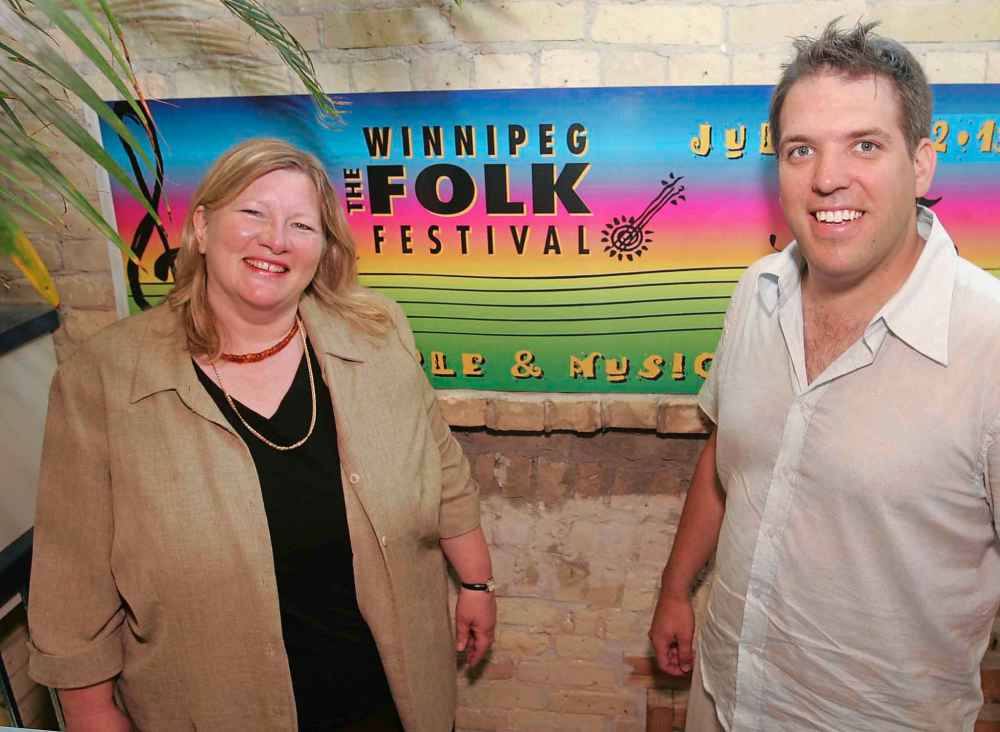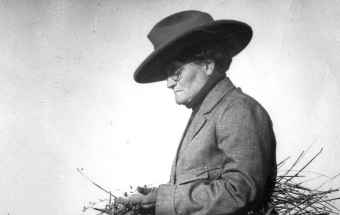Shell game WSO's determined but defiant executive director despairs over concert hall deterioration, premier's economic abandonment of culture
Read this article for free:
or
Already have an account? Log in here »
To continue reading, please subscribe:
Monthly Digital Subscription
$0 for the first 4 weeks*
- Enjoy unlimited reading on winnipegfreepress.com
- Read the E-Edition, our digital replica newspaper
- Access News Break, our award-winning app
- Play interactive puzzles
*No charge for 4 weeks then price increases to the regular rate of $19.00 plus GST every four weeks. Offer available to new and qualified returning subscribers only. Cancel any time.
Monthly Digital Subscription
$4.75/week*
- Enjoy unlimited reading on winnipegfreepress.com
- Read the E-Edition, our digital replica newspaper
- Access News Break, our award-winning app
- Play interactive puzzles
*Billed as $19 plus GST every four weeks. Cancel any time.
To continue reading, please subscribe:
Add Free Press access to your Brandon Sun subscription for only an additional
$1 for the first 4 weeks*
*Your next subscription payment will increase by $1.00 and you will be charged $16.99 plus GST for four weeks. After four weeks, your payment will increase to $23.99 plus GST every four weeks.
Read unlimited articles for free today:
or
Already have an account? Log in here »
Hey there, time traveller!
This article was published 10/05/2019 (2407 days ago), so information in it may no longer be current.
It’s not that Trudy Schroeder relishes a good fight.
It’s just that the executive director of the Winnipeg Symphony Orchestra isn’t prepared to back down from a scrap, not when it involves sticking up for things she cares about, including the WSO and its home in the aging Centennial Concert Hall.
The 59-year-old mother of two daughters agreed to be profiled by the Free Press — a chat that was supposed to last one hour but extended to almost two — and repeatedly stressed she is not a fan of confrontation, but will do whatever it takes to ensure the WSO and concert hall not only survive, but thrive.

“That’s a good question,” Schroeder said when asked if she considers herself a fighter. “I don’t know that I’m a fighter. I’m for sure an activist. I have always thought of myself as not a good fighter, but I am really good at being super-persistent and I just don’t go away.
“When I believe in something really strongly, I’m just never going to give up. And so, I guess, you can fix it now or you can fix it later, but you’re going to fix it, so fix it now, because I’ll be after you until my last breath.”
For the record, the WSO’s business boss was referring to a well-publicized dispute with the province over its years-long failure to provide $2.6 million for repairs to the concert hall’s orchestra shell.
The acoustical shell, needed for the audience — and the musicians — to hear the music properly, has been locked in place far above the stage for about four years, after it was deemed too dangerous to raise and lower it using its mechanical system.
.jpg?w=1000)
In February, Schroeder made a very public appeal to the WSO crowd to contact their MLAs to persuade them to help pay to fix the shell. That battle is far from over.
“Absolutely! Absolutely!” Schroeder declared over a latte at the Fairmont Winnipeg when asked if she will continue to press the province for cash to repair the shell, and other problems at the concert hall.
“We’re going to write more letters, we’re going to meet with more government departments, we’re going to keep pounding the concert hall itself,” she said. “We’re going to look to the federal government to see if there are programs and ways they can help.
“It was a disappointment (the province) didn’t make an announcement of that type as part of their Manitoba 150 projects. It would have been a good time to actually put some money into revamping the Centennial Concert Hall. A community’s concert hall should be a building that you’re proud of.
“When Manitoba seems not to be able to get the resources to keep one concert hall for the entire province in a reasonable state of repair, it’s a real visible sign of failure to thrive. It sends the signal this is a community that cannot get its act together. That we are really struggling.”
Orchestra invites Winnipeggers on European trip… going Dutch, of course
The Winnipeg Symphony Orchestra is preparing to do something it’s never done before — travel to Europe.
The symphony — and some of its diehard fans — will be touring the Netherlands from April 29 to May 10 next year to commemorate the 75th anniversary of that country’s liberation by Canadian troops at the end of the Second World War.
The Winnipeg Symphony Orchestra is preparing to do something it’s never done before — travel to Europe.
The symphony — and some of its diehard fans — will be touring the Netherlands from April 29 to May 10 next year to commemorate the 75th anniversary of that country’s liberation by Canadian troops at the end of the Second World War.
WSO executive director Trudy Schroeder noted local troops — Lord Strathcona’s Horse, 12th Manitoba Dragoons, The Fort Garry Horse, Royal Winnipeg Rifles, The Queen’s Own Cameron Highlanders of Canada, Princess Patricia’s Canadian Light Infantry, and 402 (City of Winnipeg) Squadron of the Royal Canadian Air Force — played a key role in liberating Holland.
“It’s a proud moment, and also poignant,” Schroeder said. “Lots of young Manitoba men lost their lives there. We’re commemorating liberation in the Netherlands but we’re also commemorating the lives and the sacrifice of that generation.
“That war effort came just as Manitoba was turning 75. We’re going now at 150. It’s our big Manitoba 150 project. I think it will help Manitobans remember that at age 75 Manitobans were already making this big world impact.”
The symphony is counting on local fans to support this historic tour by visiting their website (wso.ca) and donating to the Adopt-a-Musician program.
Schroeder said about 73 musicians will be on the tour, including soloists and the music director. “We’re a third done,” she said, noting 27 musicians have already been adopted.
“We want all of them to be sponsored. We do have some Canada Council funding. We’re definitely going, but we need this final push to get all the musicians adopted.”
The adoption fees are $5,000 for a musician, $15,000 for a soloist, and $25,000 for the music director.
“In other communities, they’d have one big humongous donor who’d give them a million dollars,” Schroeder said. “In Manitoba, our way is for everybody to help. It’s a collaborative community effort. We don’t have one person who will give us a million dollars, but we have many businesses and individuals who will step up to the plate and sponsor a musician.”
There’s a tourism component for the WSO’s first European tour.
“We’re going to take a lot of community members along as well. About 370 people have indicated interest. They haven’t all signed up,” Schroeder said.
Schroeder called the tour, which will hit some of the Netherlands’ most iconic halls, a defining moment for the orchestra and Manitoba.
“It’s our first European tour. In a way, I’m kind of shocked by that,” she said. “In Europe, they’ve got lots of orchestras already. It’s not as though every city in Europe is dying to hear an orchestra. The symphonic tradition is very strong.
“We’re hoping to use this as a showcase for Manitoba tourism, as a showcase for Manitoba business opportunities.… We are very blessed with the kind of orchestra we have and it’s time to take it on the world stage.”
The adopt-a-musician program was created in 2014 to help cover the costs of a WSO trip to Carnegie Hall in New York City.
“We went to New York with 950 Winnipeggers,” Schroeder said. “We had an after party at the Russian Tea Room… and we took over the whole place. There were Winnipeggers crawling all over New York. It was just fantastic.”
Anyone interested can call the symphony at 204-949-3950 or go online at WSO.ca.
doug.speirs@freepress.mb.ca
As the WSO’s executive director for the past 11 seasons, Schroeder doesn’t wield a baton, but she is responsible for orchestrating the business decisions required to keep the music flowing.
Julian Pellicano, the resident conductor for the WSO, put it succinctly prior to a recent performance when asked to describe Schroeder: “She’s a wonderful woman, and a great leader.”
There’s a lot the public doesn’t know about the woman at the helm of the WSO. For instance, she has some serious training in the art of winning arguments.
“In 1977, when I was in high school at Mennonite Brethren Collegiate Institute, I was one of the top provincial debaters that went to the nationals,” she recalled. “So I was sort of trained in critical thought and debating and making an argument —not for the sake of fighting — but to find the truth and the best way forward.”
Schroeder is passionate about writing and pens a monthly column for seniors, she plays the clarinet and is never more relaxed than when firing up the grill at the family cottage.
“I like barbecuing things,” she said. “I didn’t realize that until we bought a cottage two years ago. I love to grill pineapple. It’s fantastic. I don’t love cooking, but I love to barbecue.”
Born in Winnipeg, her early years were spent on an acreage in Clover Plains, where her father taught in a one-room schoolhouse. She has three younger brothers.
Schroeder’s mother, who worked as a nurse in Morris, was one of the biggest influences in her life. “My mom is just a live wire,” she said. “She has a volunteering activity every day. She nursed through my entire life… at a time when not everybody’s mom had a job outside the home.
“And my dad (who died five years ago) was very supportive of that. He always said the best insurance a family can have is that both the mother and father work. Working was a big thing in my family.”

The constant thread has been music. By the time she was four or five, she was picking out tunes on the piano. And she sang with the Mennonite Children’s Choir.
“When kids sing together and they sing beautifully, it is amazingly powerful. I think that’s when I first understood how powerful music can be.”
At the age of 18, she signed up for the Canada World Youth program, and spent several summers getting a remarkable series of experiences working in a psychiatric hospital in Montreal, sorting potatoes on a farm in New Brunswick and volunteering in Senegal.
Then it was off to Laval University in Quebec, where she learned French and found love, marrying Norman Dyck, now her husband of 38 years. “I always said I’d never marry a Mennonite man, and I went to Quebec City to study at Laval and there was only one Mennonite man in the entire city and I met him and married him. Never say never.”
She wasn’t learning French hanging out with English kids, so she visited the music school and asked to study with the francophone students, which is how she became a singer.
“For a while in university I sang in a rock band. It was kind of Quebecois folk rock, of all things. I love any kind of good music. This year, at our New Music Festival, we had this heavy metal band. Heavy metal is one thing I could not understand. This band was called Animals as Leaders. They have quite a following — the whole audience was young men with knitted caps — and I loved it.”

Her husband’s career as an air traffic controller moved them around the country, and were culture jobs in Cornwall, Ont., Gloucester — an Ottawa suburb — and also in the nation’s capital, itself.
“The work I did in Ottawa (as a consultant) was pivotal to the kind of arts manager I am today. I was the person they would have work with arts organizations in trouble to try and help them. Underlying a healthy, productive arts organization is a business model that works.”
In 1995, it was back to Winnipeg, where the couple had their second child — they have two daughters, Nina, now 28, and Katrina, 22 — and Schroeder launched a consulting firm, while also studying for an MBA.
Before becoming the queen of classical music, she was queen of the folkies, spending 10 years as executive director of the Winnipeg Folk Festival. She gave them a solid financial underpinning — “we had 10 years of surpluses while I was there” — and fell in love with banjo music.
In 2008, she applied for the top job with the WSO. “The symphony had been struggling so much for such a long time,” she recalled. “When a symphony struggles, because it’s such a central and pivotal institution, the whole community suffers. I wanted it to stabilize, and I thought I had something to bring to that process.”
It’s her dream job, but there have been a few sour notes. Along with the acoustic shell woes, the city opted to sell Pantages Playhouse Theatre to a pair of developers, rebuffing the WSO, which had been operating Pantages for years at no charge and was hoping to renovate the history-steeped building and move its administrative team into the space.
.jpg?w=1000)
Earlier this month, the province sent a letter to the Manitoba Centennial Centre Corp., which manages the concert hall and is the WSO’s landlord, telling it to work on a five-year plan to become self-sufficient.
What that means for the symphony is unclear, but Schroeder is worried.
“It’s too early for me to say, but my initial thought is this is a really bad idea,” she says. “I just don’t think it is possible to run a performing arts, and museum and theatre and art space without any kind of public-sector financing. I don’t know why the province would be trying to say it’s not their business, because it is their business.”
Whether a fighter or not, she’s standing up for the arts on our behalf.
“I am a cultural activist, fighting for people to have access to great works of art so they can be better community members,” she said. “We can fight to create a society where people can be inspired by the greatest thinkers.”
doug.speirs@freepress.mb.ca
.jpg?w=1000)

Doug has held almost every job at the newspaper — reporter, city editor, night editor, tour guide, hand model — and his colleagues are confident he’ll eventually find something he is good at.
Our newsroom depends on a growing audience of readers to power our journalism. If you are not a paid reader, please consider becoming a subscriber.
Our newsroom depends on its audience of readers to power our journalism. Thank you for your support.











